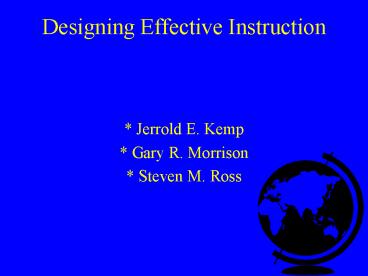Designing Effective Instruction - PowerPoint PPT Presentation
1 / 22
Title: Designing Effective Instruction
1
Designing Effective Instruction
- Jerrold E. Kemp
- Gary R. Morrison
- Steven M. Ross
2
Introduction to the Instructional Design Process
- Chapter
- 1
3
The Complete Instructional Design Plan
Planning
Revision
Instructional Problems
Confirmative Evaluation
Implementation
Evaluation Instruments
Learner Characteristics
Development of Instruction
Task Analysis
Designing the Message
Instructional Objectives
Summative Evaluation
Instructional Strategies
Content Sequencing
Support Services
Formative Evaluation
Project Management
4
Introduction to the Instructional Design Process
5
The Teaching/Learning Process... the Why's
- Global Economy
- Information-based economy
- Diverse Work Force
6
Curriculum
- Subject content and skills that
comprise a program
7
Curriculum
- Purpose or mission
- Goals for education or training
- Categorization and organization of instruction
8
Background for Curriculum Development
- Educational purposes
- Educational experiences to obtain purposes
- Organizing experiences
- Attaining purposes
9
Limitations of Curriculum Planning
- Diverse populations
- Motivation
- Teaching and Learning methods
- Competency Levels
- Technology
- Cost
- Job satisfaction
10
Training Problems
- Learning for specific job performance
- Increase in efficiency
- Training meeting organizations needs
11
The Role for Instructional Design
- Level of readiness
- Teaching and learning methods
- Media and resources
- Support needs
- Achieving objectives
- Revisions
12
Preparing to Plan
- Different considerations
- Order of sequence
13
Key Elements of the Instructional Design Process
- For whom is the process being developed
- What do you want to be learned
- How is the content or skill best learned
- How do you determine the extent of the
learning that has been achieved
14
The Complete Instructional Design Plan
- Instructional problems
- Learner characteristics
- Task Analysis
- Instructional objectives
- Content sequencing
- Instructional strategies
- Designing the message
- Development of instruction
- Evaluation instruments
15
Elements of the Instructional Design Plan
Planning
Revision
Instructional Problems
Confirmative Evaluation
Implementation
Evaluation Instruments
Learner Characteristics
Development of Instruction
Task Analysis
Designing the Message
Instructional Objectives
Summative Evaluation
Instructional Strategies
Content Sequencing
Support Services
Formative Evaluation
Project Management
16
An Instructional Design Model
Revision
Topic
Objectives
Instruction
Evaluation
Revision
17
Also included concerns related to
- Formative Evaluation
- Summative Evaluation
- Confirmative Evaluation
- Planning
- Project Management
- Support Services
- Implementation
- Revision
18
Instructional Design Process Premises
- Systematic Procedure and Specificity..
- Starts at Course Development Level
- Use of Instructional Design Plan
- Procedural Goals
- Expected Level of Learning
- The Best Way to Design
19
Benefits of Using the Instructional Design Process
20
Applying the Process to Education and Training
Programs
21
Whos Who in the Instructional Design Process
22
Answering the Critics
- http//www.trainingsupersite.com/
- publications/archive/training/2000/0004/004cv.htm































